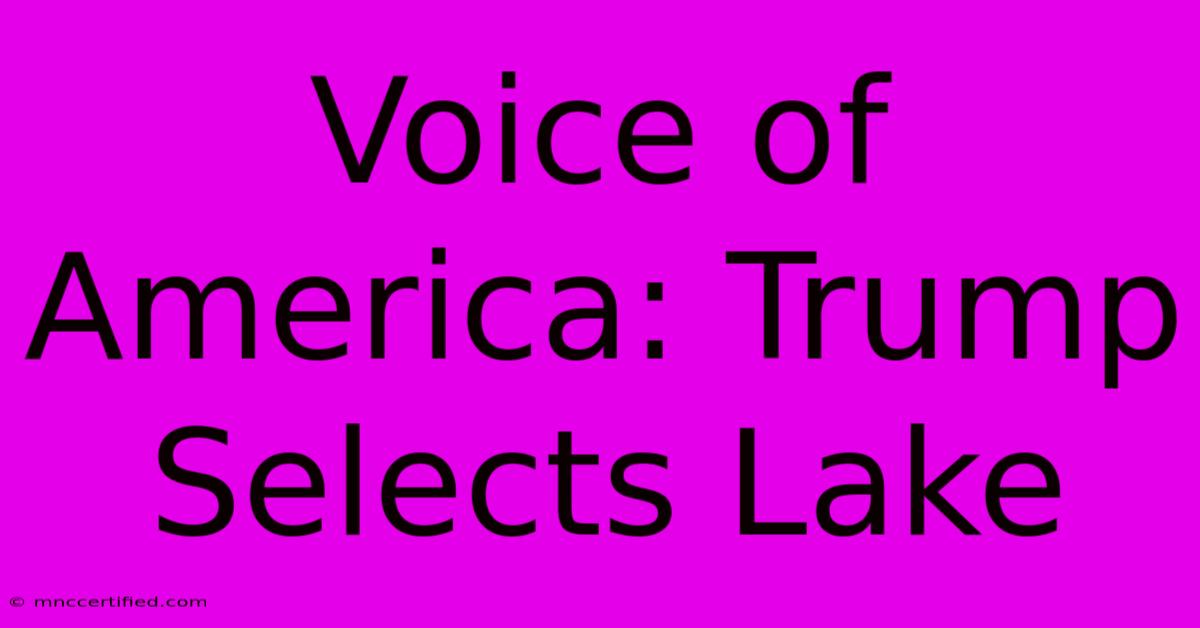Voice Of America: Trump Selects Lake

Table of Contents
Voice of America: Trump Selects Lake – A Deep Dive into the Implications
The recent announcement of Kari Lake as a potential Voice of America (VOA) director under a hypothetical second Trump administration has sent ripples across the political spectrum. This article delves into the implications of this controversial selection, examining Lake's background, her potential impact on VOA's journalistic integrity, and the broader consequences for American foreign policy.
Understanding Kari Lake's Background and Public Persona
Kari Lake, a former television news anchor, gained prominence through her staunch support of Donald Trump and her embrace of conservative viewpoints. Her political career, marked by unsubstantiated claims of election fraud and a strong emphasis on partisan rhetoric, has sparked significant debate. Understanding Lake's past is crucial to assessing her potential leadership of a crucial international broadcasting organization like VOA.
Key Aspects of Lake's Public Image:
- Controversial Election Claims: Lake's persistent and unsubstantiated allegations of widespread voter fraud following the 2020 presidential election have raised concerns about her commitment to factual reporting and objectivity. This directly contradicts VOA's mandate of unbiased news dissemination.
- Partisan Rhetoric: Her strong alignment with the Republican party and her frequent use of divisive language have led critics to question her ability to lead an organization that must maintain neutrality in its global coverage.
- Lack of Journalism Experience: While Lake has a background in television news, her experience largely focuses on presenting news rather than directing a large-scale international news organization. Managing VOA requires expertise in international relations, journalistic ethics, and budgetary oversight – areas where Lake's experience is less clear.
Potential Impact on VOA's Journalistic Integrity
The appointment of Kari Lake as VOA director poses a significant threat to the organization's reputation for unbiased reporting. VOA's charter mandates the dissemination of accurate and objective news to a global audience. Lake's history of promoting unsubstantiated claims and engaging in partisan rhetoric raises serious concerns about whether she would uphold this mandate.
Threats to VOA's Independence:
- Erosion of Trust: Lake's appointment could damage VOA's credibility among its international audiences, who rely on the organization for impartial news coverage. This erosion of trust could have far-reaching consequences for American soft power and diplomatic efforts.
- Political Interference: Her known political leanings could lead to accusations of political interference in VOA's editorial decisions, potentially resulting in biased coverage that favors the Trump administration's agenda.
- Suppression of Dissenting Voices: There are concerns that Lake's leadership could lead to the silencing of dissenting voices within VOA and a bias towards narratives that align with her political views.
Broader Implications for American Foreign Policy
VOA plays a vital role in shaping America's image and influence globally. The choice of its director has significant implications for US foreign policy. A director who prioritizes partisan agendas over journalistic integrity could undermine American credibility and damage relationships with key allies.
Consequences for US Diplomacy:
- Damage to Soft Power: A compromised VOA would weaken America's ability to project its values and influence through positive public diplomacy.
- Strained International Relations: Biased reporting could alienate international audiences and harm diplomatic efforts.
- Loss of Strategic Influence: A less credible VOA would diminish America's ability to counter disinformation campaigns and promote democratic values abroad.
Conclusion: A Critical Crossroads for VOA
The potential appointment of Kari Lake as VOA director represents a critical juncture for the organization and American foreign policy. Her background and public persona raise serious concerns about her ability to uphold VOA's commitment to journalistic integrity and unbiased reporting. The consequences of such a choice could be far-reaching and potentially damaging to America's global standing and influence. Further scrutiny and public debate are essential to ensuring that VOA maintains its crucial role as a beacon of independent journalism in a complex and increasingly polarized world. The future of VOA, and its role in promoting American values abroad, hangs in the balance.

Thank you for visiting our website wich cover about Voice Of America: Trump Selects Lake. We hope the information provided has been useful to you. Feel free to contact us if you have any questions or need further assistance. See you next time and dont miss to bookmark.
Featured Posts
-
Wardrobing 100 Party Dresses My Story
Dec 13, 2024
-
49ers Guerendo Plays Greenlaw Returns
Dec 13, 2024
-
Scotland U23 Squad Named For Italy Debut
Dec 13, 2024
-
You Tube Tv Price Increase Explained
Dec 13, 2024
-
Dre Greenlaw Bosa Play Vs Rams
Dec 13, 2024